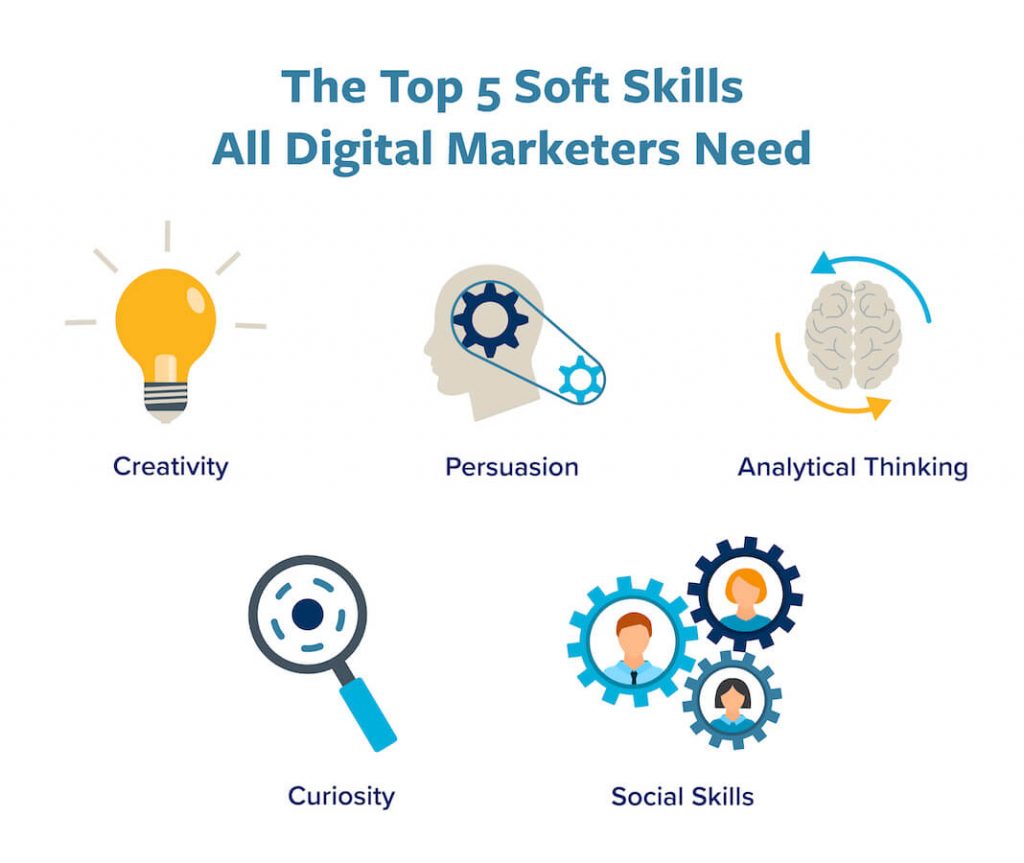How to Learn the Top Digital Marketing Skills
Today’s ever-changing, multifaceted digital marketing industry requires a versatile skill set. Aspiring marketers must be well-versed in audience-specific communication, strategic thinking and flexibility when approaching a variety of responsibilities. Marketing companies depend on such traits to remain competitive as new best practices emerge. For example, according to Social Media Examiner’s 2021 Social Media Marketing Report (PDF 14.3 MB), 47 percent of surveyed marketers intend to increase their advertising efforts on Facebook alone in the coming years.
Fortunately, there are several effective educational paths through which one can learn digital marketing skills. These paths include digital marketing bootcamps, traditional degrees and self-taught options.
Digital Marketing Bootcamps
Digital marketing bootcamps offer practical instruction, providing hands-on, real-world experiences participants will encounter as digital marketing professionals. These programs are usually quick to complete (e.g., Berkeley Digital Marketing Boot Camp is just 18 weeks long) and are accessible to any prior experience level. These characteristics make bootcamps an ideal choice for aspiring marketers, upskillers and job switchers alike.
For Korinne Munson — a senior communications professional in the wine and spirits industry — the three most career-changing topics covered in depth by Berkeley Digital Marketing Boot Camp were email marketing, channel strategy and website optimization.
Read her story here.
Digital Marketing Degrees
Alternatively, traditional degrees provide a considerable amount of valuable digital marketing knowledge, though they generally take longer to complete and are less hands-on. These options allow learners to hone key industry skills in a more general, communal environment; following course curricula associated with an applicable major program. Degree-related instruction is usually not as hands-on as that of a digital marketing bootcamp, but it does offer a bridge between specialized marketing techniques and general knowledge in parallel fields.
Self-Taught Options
Self-taught options, on the other hand, cater to individuals interested in learning digital marketing at their own pace in a customized structure. These options can range from online courses and educational apps to digital guides. Since self-guided resources are heavily reliant on self-discipline, learners must be focused, committed and well-organized as they navigate their preferred medium of study.
Also, see our guide 20 Free Digital Marketing Resources to Get You Started.
The Top Five Soft Skills All Digital Marketers Need
While tech skills are vital for digital marketers, soft skills are equally important. These skills are rooted in a worker’s personality, emotional IQ, maturity level and self-confidence (among countless other concentrations). Collectively, soft skills are a natural complement to technological knowledge and, given digital marketing’s blend of tech-savviness and intuition, they are areas worth honing while on the path to industry employment.
The following are five of the most valuable soft skills in digital marketing.

1. Creativity
A timelessly relevant soft skill, creativity sits at the heart of most successful digital marketing campaigns. Modern marketers must be creative in a variety of capacities to differentiate their ads from competitors — simply defaulting to generic copy and stock images is no longer enough. Today’s audiences are subject to a flurry of different ads tailored to their personal interests, web habits and social media connections. With that said, a little imagination can go a long way in structuring an ad to stand out and capture engagement.
Learn more about creativity in marketing:
2. Persuasion
The art of marketing hinges on persuasion. You are basically trying to persuade your audience that your content is more relevant, valuable and important to them than all the other content competing for their attention. Inherently, this process can be complex, as your writing and design choices must be employed with different perspectives in mind — who is your target audience and what copy or imagery will persuade them to engage with your ad? This type of logical, forward-thinking strategy is imperative in creating effective, long-lasting campaigns that yield desirable returns and forge habitual interest amongst your audience.
Learn more about persuasion in marketing:
3. Analytical Thinking
Digital marketing is a metric-driven industry, so strong analytical knowledge is a must. However, in a soft skill sense, this knowledge must include the ability to interpret each metric’s performance-based implications and consider them when contemplating potential changes to campaigns. By developing a full understanding of marketing campaign analytics, you will be able to reinforce your intuition-based decisions with hard stats while cultivating a more informed ad creation process.
Learn more about analytical thinking in marketing:
4. Curiosity
The marketing world is constantly changing and this warrants a consistent desire to fine-tune deficiencies, take advantage of new trends and glean key industry lessons. All of these actions stem from curiosity, making it one of the industry’s most important soft skills. As a marketer, you should never become complacent, regardless of your current success or body of knowledge. Stay up to speed on significant marketing headlines, updates to ad programs or outlets and report changes to consumer behavior. Keeping your knowledge of consumer trends and media current will make you unflappable in the face of sudden challenges; allowing you to focus on innovation in lieu of damage control.
Learn more about curiosity in marketing:
5. Social Skills
Most digital marketing campaigns are collaborative efforts, and navigating these projects requires a strong set of social skills. Regardless of your role within the team, you must be both personable and adept in communication. These social skills will ensure you are doing your part to foster a culture of trust, transparency and cohesion. This skill set is also vital in an external sense, as a large portion of modern marketing is rooted in social media communities. Understanding how users interact successfully within these environments can aid in stronger, more individualized ad creation and benefit your team’s efforts overall.
Learn more about social skills in the marketing workplace:
 Live Chat
Live Chat


5. Social Media
Social media presence is almost synonymous with digital marketing success in 2023. It is essentially digital marketing’s symbiotic partner, offering a landscape predicated on personalization. Many leading social media platforms include their own internal forms of targeted advertising which are typically placed within each platform’s unique infrastructure. For example, Facebook allows ads to be targeted based on any number of relevant similar likes, so a local concert ad could be targeted to Facebook users who have liked the pages of similar artists — or those who have liked applicable pages within the community (other music venues, record stores, etc.).
Learn more about social media: